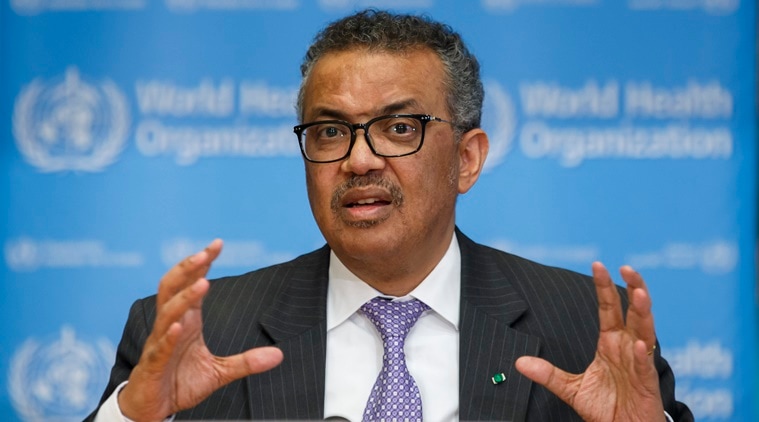 There were “worrying upward trends” in early epidemics in parts of Africa and central and South America, WHO director-general Tedros Adhanom Ghebreyesus said. (File)
There were “worrying upward trends” in early epidemics in parts of Africa and central and South America, WHO director-general Tedros Adhanom Ghebreyesus said. (File)
Warning countries against complacency and urging them to prepare for a long and drawn out fight against the coronavirus, WHO chief Tedros Adhanom Ghebreyesus on Wednesday said some of them have started to see a resurgence in cases.
“Most countries are still in the early stages of their epidemics and some that were affected early in the pandemic are starting to see a resurgence in cases,” Tedros told Geneva journalists in a virtual briefing.
There were “worrying upward trends” in early epidemics in parts of Africa and central and South America, WHO director-general Tedros Adhanom Ghebreyesus said.
“Make no mistake we have a long way to go. This virus will be with us for a long time,” he said, while noting that epidemics in Western Europe appear to be stabilising or declining.
He hoped the Trump administration would reconsider its suspension of funding, but that his main focus was on ending the pandemic and saving lives.
U.S. President Donald Trump last week criticised the WHO’s handling of the pandemic and announced he was suspending funding to the U.N. agency. U.S. Secretary of State Mike Pompeo on Wednesday said the United States strongly believes that China’s ruling Communist party failed to report the outbreak of the new coronavirus in a timely manner to the WHO.
“I hope the freezing of the funding will be reconsidered and the US will once again support WHO’s work and continue to save lives,” Tedros said. “I hope the U.S. believes that this an important investment, not just to help others but for the U.S. to stay safe also.”
The WHO’s top emergencies expert Dr. Mike Ryan warned against opening up global travel too quickly, saying it would require “careful risk management”.
He noted surges in infections in Africa such as a nearly 300 percent increase in cases in Somalia in the past week. “We are at the beginning in Africa,” Ryan said.
The WHO officials urged countries to continue investing in preparedness, saying that only 76 percent had surveillance systems to detect cases.
“There are still many gaps in the world’s defences and no single country has everything in place,” said Tedros.
Amid criticism that it should have acted earlier, Tedros defended the WHO’s decision to declare an international emergency only on Jan. 30 – its highest level of alert.
“Looking back I think we declared the emergency at the right time and when the world had enough time to respond,” said Tedros, adding that on that date there were only 82 COVID-19 cases outside of China and no deaths at the time.
Jeremy Farrar, director of the Wellcome Trust global health charity, said that the world would need to learn to live with the new COVID-19 disease. “This is not a discrete one-off episode. My belief is that this is now an endemic human infection…We’re going to have to find ways to deal with that,” he told an online media briefing.
Don’t miss these articles on Coronavirus from the Explained section:
‣ How coronavirus attacks, step by step
‣ Mask or no mask? Why the guidance has been shifting
‣ Besides a face cover, should I wear gloves when I go outdoors?
‣ How the Agra, Bhilwara and Pathanamthitta Covid-19 containment models differ
‣ Can coronavirus damage your brain?